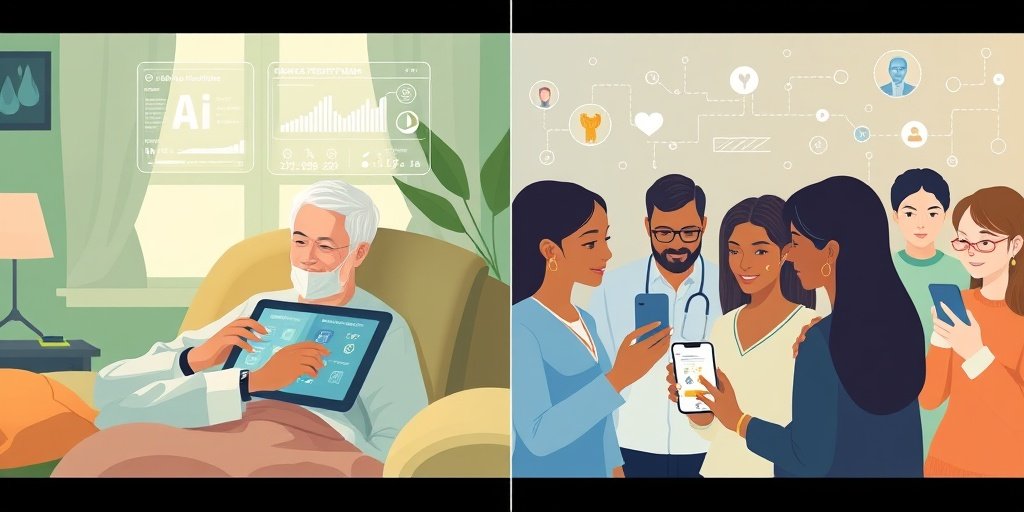⚡ Quick Summary
The integration of mobile health (mHealth) technologies into decentralized clinical trials (DCTs) in oncology represents a significant advancement, addressing challenges in trial design and execution. These innovations promise to enhance patient monitoring, engagement, and data collection, ultimately improving recruitment and treatment adherence.
🔍 Key Details
- 📊 Technologies: Wearable biosensors, telemedicine platforms, AI-driven analytics
- 🌐 Focus: Decentralized clinical trials in oncology
- 🚀 Goals: Improve recruitment rates, optimize treatment adherence, ensure equitable access
- 🔒 Challenges: Regulatory complexities, data privacy concerns, technological disparities
🔑 Key Takeaways
- 📱 mHealth tools can enable real-time patient monitoring.
- 💡 AI-driven analytics support participant engagement and facilitate remote data collection.
- 🌍 Enhanced access to clinical trials for patients in underserved regions.
- 🔍 Precision oncology approaches can leverage mHealth data for personalized treatment strategies.
- ⚖️ Regulatory and privacy challenges must be addressed for widespread adoption.
- 🔗 Future technologies like blockchain may enhance trial scalability and efficiency.
- 🏥 Patient-centric approach could accelerate drug development and improve clinical decision-making.

📚 Background
The landscape of oncology research is evolving, with traditional clinical trials often facing challenges such as recruitment difficulties and limited patient engagement. The advent of mobile health (mHealth) technologies offers a promising solution, enabling researchers to conduct decentralized clinical trials (DCTs) that are more accessible and efficient. By integrating these technologies, we can address longstanding issues in clinical trial design and execution.
🗒️ Study
This narrative review explores the transformative role of mHealth technologies in DCTs within oncology. The authors, Cicin FN and Cicin I, highlight how tools like wearable biosensors and telemedicine platforms can facilitate real-time monitoring and data collection, ultimately leading to improved patient outcomes and engagement.
📈 Results
The integration of mHealth technologies has shown potential to significantly enhance recruitment rates and treatment adherence in clinical trials. Moreover, the use of precision oncology approaches that leverage mHealth data may lead to more personalized treatment strategies, improving overall patient outcomes.
🌍 Impact and Implications
The implications of integrating mHealth innovations into oncology trials are profound. By enabling more equitable access to clinical trials, particularly for patients in underserved regions, we can foster a more inclusive research environment. Additionally, the potential for real-time monitoring and data collection can accelerate drug development and enhance clinical decision-making, ultimately benefiting patients and healthcare providers alike.
🔮 Conclusion
The integration of mHealth technologies into decentralized oncology trials represents a significant shift towards a more patient-centric, data-driven approach in clinical research. By embracing these innovations, we can address existing challenges and improve patient outcomes, paving the way for a brighter future in oncology research. Continued exploration and development in this field are essential for realizing the full potential of mHealth in clinical trials.
💬 Your comments
What are your thoughts on the integration of mHealth technologies in oncology trials? We would love to hear your insights! 💬 Leave your comments below or connect with us on social media:
Integrating mHealth Innovations into Decentralized Oncology Trials.
Abstract
The integration of mobile health (mHealth) technologies into decentralized clinical trials (DCTs) may represent a paradigm shift in oncology research, offering innovative solutions to longstanding challenges in clinical trial design and execution. mHealth tools, including wearable biosensors, telemedicine platforms, and artificial intelligence (AI)-driven analytics, have the potential to enable real-time patient monitoring, support participant engagement, and facilitate remote data collection. Also, these advancements have the potential to improve recruitment rates, optimize treatment adherence, and ensure more equitable access to clinical trials, particularly for patients in underserved regions. Moreover, precision oncology approaches leveraging mHealth data may contribute to personalized treatment strategies that improve patient outcomes. However, regulatory complexities, data privacy concerns, and technological disparities remain critical challenges that must be addressed to ensure the widespread adoption of mHealth-enabled DCTs. Future advancements in AI, blockchain technology, and remote diagnostic tools may further enhance the scalability, efficiency, and inclusivity of these trials. By embracing these innovations, oncology research can transition toward a more patient-centric, data-driven paradigm that has the potential to accelerates drug development and enhances clinical decision-making. This narrative review explores the potentially transformative role of mHealth technologies in DCTs within oncology.
Author: [‘Cicin FN’, ‘Cicin I’]
Journal: J Med Syst
Citation: Cicin FN and Cicin I. Integrating mHealth Innovations into Decentralized Oncology Trials. Integrating mHealth Innovations into Decentralized Oncology Trials. 2025; 49:103. doi: 10.1007/s10916-025-02233-9